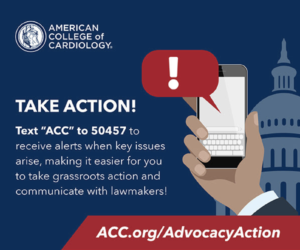Advocacy Chair
NYACC in Action
Leadership Testimonials
Aaron Kitchcart, MD, PhD, FACC
NYACC’s delegate to the Medical Society of the State of New York (MSSNY)
Michael J. Wolk, MD, MACC
NYACC’s Interspecialty Committee Representative for the Medical Society of the State of New York (MSSNY)
Advocacy
Whether it is sending an email to members of Congress, hosting lawmakers at a practice visit, or going to Washington D.C. as part of the annual Legislative Conference, there are many ways for you to be an effective advocate.
Note: The New York State Chapter relies upon its Government Relations Committee and its close association with the Medical Society of the State of New York (MSSNY) and other New York State Specialty Society in order to monitor legislative and regulatory activities and the initiation of grassroots lobbying efforts.
Members of the NYACC Advocacy Committee are:
- Chair – Aaron Kithcart, MD, PhD, FACC
- Dimitry Feldman, MD, FACC
- Sei Iwai, MD, FACC
- Rajiv Jauhar, MD, FACC
- Suneet Mittal, MD, FACC
- Srihari S. Naidu, MD, FACC, FAHA, FSCAI
ICYMI: Your ACC on The Hill Advocating For Patient Voices
In case you missed it, Richard J. Kovacs, MD, MACC, recently testified on behalf of the ACC before the House Energy and Commerce Committee’s Subcommittee on Health regarding reauthorization of the Medical Device User Fee Act by the FDA. In his testimony, Kovacs stressed the importance of finding additional ways to incorporate the patient voice within the device development process and the total product life cycle. Learn more in the May issue of Cardiology magazine.
3/24/2020 – Telehealth, Licensure/Practice Across State Lines & Liability (Good Samaritan Health Professional Act (S. 1350/H.R. 6283)
Amid COVID-19 concerns, it is far from business as usual in most state capitols, with executive and legislative responses to the COVID-19 pandemic evolving rapidly. At this time, all states have taken some type of executive level action to encourage social distancing, such as closing schools, placing limits on public gatherings, or voluntary or mandatory closure of nonessential business. Many legislatures have temporarily suspended their legislative sessions to comply with limits on public gatherings, while others are rushing to finish essential business, like budgets and urgent COVID-19 bills, as quickly as possible. Many of the same concerns and requests for governmental action communicated by ACC, AMA, and others at the federal level are also being shared by many different stakeholders with state policymakers. These requests include additional action to address shortages of PPE and essential equipment to care for patients, reducing barriers to telehealth, and economic support for practices and institutions to preserve the healthcare system, patient access, and jobs.
Telehealth
Federal action has significantly expanded access to telehealth for Medicare and Medicaid patients, but state barriers related to coverage, modality, payment, and licensure also must be addressed. ACC has called for more aggressive action at the federal level on such issues as allowing voice-only and easing rules around interstate care, but some states have already taken significant action of their own. The Center for Connected Health Policy is tracking COVID-19 related state actions specific to telehealth, in particular those related to coverage and payment.
Licensure and Practice Across State Lines
The Federation of State Medical Boards is tracking states waiving licensure requirements and renewals. However, some state licensure waivers may be limited to volunteer services and may not cover general telehealth services.
Liability
At the federal level, ACC supports the Good Samaritan Health Professional Act (S. 1350/H.R. 6283), which would apply limited civil liability protections to volunteer clinicians during a federally declared disaster.
5/27/2022 – ACC Submits Comments to AHRQ on Patient-Centered Outcomes Framework
In response to the U.S. Agency for Healthcare Research Quality’s (AHRQ) request for comment, your ACC delivered input on the agency’s proposed strategic framework for Patient-Centered Outcomes Research Trust Fund (PCORTF). “The ACC supports AHRQ in their quest to improve the quality, safety, equity, and value of healthcare and strives to improve delivery and outcomes for both patients and clinicians,” the letter states. “PCORTF investments can make significant contributions to achieving these aims.” Read the full letter.
5/26/2022 – Bipartisan Prior Authorization Reform Bill Backed by Better Medicare Alliance (H.R. 3173)
The Improving Seniors’ Timely Access to Care Act (H.R. 3173), a bipartisan bill supported by your ACC and more than 400 health organizations, gained the critical endorsement of the Better Medicare Alliance last week. The bill, which would require Medicare Advantage plans “to establish an electronic prior authorization program,” now moves to the House floor. ACC President Edward T. A. Fry, MD, FACC, voiced the College’s support for this move toward Medicare reform, saying: “The Improving Seniors’ Timely Access to Care Act would increase efficiency and transparency for prior authorization within the Medicare Advantage program. This legislation will help the patients we treat, while also reducing administrative burden, removing barriers to care, lowering cost of care, and improving care team well-being. The ACC urges Congress to pass this bipartisan and widely supported legislation.” Learn more.
5/24/2022 – ACC, Others Endorse AMA Framework for Medicare Payment Reform
Medical Societies are working together to address shortcomings in the Medicare payment system. An American Medical Association (AMA)-led document, endorsed by your ACC along with 120 other health groups, outlines the guiding principles of what a “rational” system for Medicare payment should look like. The document highlights the importance of developing a stable and predictable payment system, advancing value-based care and preserving the right of the patient to high quality care. The AMA is currently working to develop concrete policy recommendations that will help to meet the goals set in this overarching document. Read more.
5/16/2022 – CMS Releases New Value-Based Care Educational Resources
As part of efforts to improve beneficiary education around value-based care, the Centers for Medicare and Medicaid Services (CMS) has released several new educational resources to improve awareness and promote the benefits of receiving care under alternative payment models (APMs). Three resources have been released, including a video describing the role of the Center for Medicare and Medicaid Innovation (CMMI) and APMs, a second video describing accountable care relationships and accountable care organizations, and a glossary of key concepts with links related to CMMI’s work.
6/25/2019 – Improving Seniors’ Timely Access to Care Act of 2019 (H.R. 3107)
Significant, bipartisan federal legislation was recently introduced that would provide necessary reforms to the prior authorization process. We urge you to ask your member of Congress to support the Improving Seniors’ Timely Access to Care Act of 2019 (H.R. 3107). The legislation would make several changes to items and services in Medicare Advantage plans. Specifically, the bill would:
- Create a “real-time” electronic prior authorization process, developed by the Secretary of HHS, for items and services that are routinely approved;
- Improve transparency by requiring plans to report to CMS on the extent of their use of prior authorization and the rate of approvals or denials;
- Require plans to adopt transparent prior authorization programs that are reviewed annually, adhere to evidence-based medical guidelines, and include continuity of care for individuals transitioning between coverage to minimize any disruption in care;
- Hold plans accountable for making timely prior authorization determinations and to provide rationales for denials;
- Prohibit additional prior authorization for medically-necessary services performed during a surgical or invasive procedure that already received, or did not initially require prior authorization.
The ACC has been a driving force behind the introduction of this legislation, working with the authors to ensure that this will make a series of positive reforms to improve patient care. It is our hope that this important step forward will bring about much needed changes to the prior authorization process.
Please urge your member of Congress to cosponsor H.R. 3107 to reduce unnecessary barriers to patient care.





